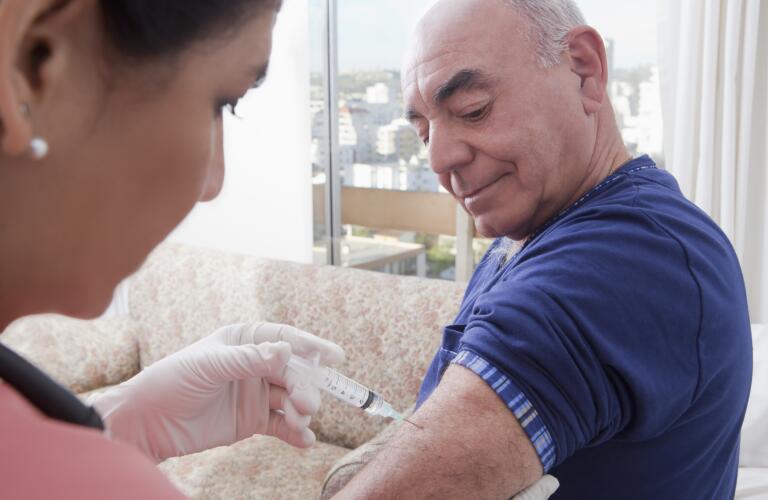
Grandchildren are one of life’s greatest joys. Part of helping your grandchildren succeed in life involves keeping them…and yourself…as healthy as possible. And keeping yourself healthy means receiving certain vaccinations for common, easily transmittable diseases, like whooping cough. Whooping cough, also known as pertussis, is a respiratory tract infection that’s very contagious. If you have whooping cough, you could easily transmit the infection to your grandchildren.
Fortunately, a whooping cough vaccine for adults has been around for many years. The vaccine is usually easily accessible and is generally inexpensive. While you probably received the vaccination as a child as part of your routine healthcare, the immunity the shot provides does wear off over time. That’s why it’s important to ask your doctor about Tdap, the whooping cough vaccine, especially if your grandchildren are babies or toddlers. Getting revaccinated can help keep everyone in your family as healthy as possible.
Whooping Cough Basics
Whooping cough, or pertussis, is a highly contagious respiratory infection caused by the bacteria Bordetella pertussis. Whooping cough is easily spread from person to person through direct contact, sneezing, or coughing. The illness can affect people of all ages, but usually only affects children who haven’t completed the entire vaccination course or adults who don’t have immunity to the disease anymore.
If you’re infected with whooping cough, it can take up to 10 days for you to show symptoms of the disease. This means that, if you’re around grandchildren and you’re infected, you could pass the disease on to them without even knowing it. Most infants and young children are infected by the people closest to them, including grandparents, parents, and siblings. And since the 1980s, cases of whooping cough within the United States have been on the rise.
Unfortunately, whooping cough can have especially severe consequences for infants and young children. For some babies and toddlers, these complications may include:
Brain damage
Many children with whooping cough require treatment at a hospital because of the risk of complications. For infants six months old or younger, early treatment is especially important because these complications may be life-threatening.
Tdap Vaccine Helps Keep Your Family Healthy
Fortunately, getting vaccinated against whooping cough is one of the best and easiest ways to help keep yourself and your grandchildren healthy. Today, doctors use two kinds of vaccines to help protect against pertussis. Both vaccines also help protect against other contagious diseases.
For adults, the whooping cough vaccine is combined with two other vaccines which offer protection against tetanus and diphtheria. Commonly known as the Tdap vaccine, this combination of medications helps reduce your likelihood of infection with each of the three diseases for as long as 10 years. But you can receive a Tdap injection anytime, especially if you need specific protection against whooping cough.
Most people tolerate the Tdap vaccine well, and, if they have side effects, they’re generally mild. If you receive the Tdap vaccine, your side effects may include:
Redness, swelling, and pain at the injection site
Tiredness
Agitation
Upset stomach
Generally, the Tdap vaccine works well to protect people against whooping cough. But research shows the effectiveness of the vaccine declines over time, and only three or four people are still protected four years after receiving a Tdap shot. It’s important to stay on top of your vaccination schedule, especially if you have babies or young children in your family.
Whooping cough is a serious illness, but you can help protect yourself and your grandchildren by making sure you take advantage of the whooping cough vaccine. The Tdap vaccine is one of the best ways to help prevent your grandchildren from becoming infected with the bacteria that causes whooping cough. If you’re concerned about the risk to yourself or your grandchildren, talk with your doctor about receiving the Tdap vaccine. Your doctor can help you stay as healthy as possible and ensure you receive your vaccinations on time.




